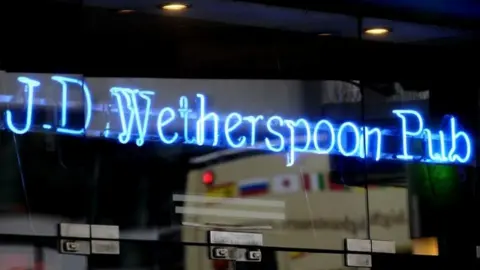Coronavirus: Sick pay rules apply, says JD Wetherspoon pub chain
 PA Media
PA MediaOne of the UK's biggest employers says staff will be subject to regular statutory sick pay rules if they self-isolate owing to coronavirus.
Pub chain JD Wetherspoon, which has 45,000 employees, said the virus was being treated like any other illness.
Under statutory sick pay rules, an employee is not paid for the first three days of absence, and then only if they earn at least £118 a week.
Strictly speaking, there is no right to sick pay for anyone in self-isolation.
However, arbitration service Acas said it was "good practice" for employers to treat it as sick leave or agree for the time to be taken as holiday.
Statutory sick pay is worth £94.25 a week for eligible employees who have been off work owing to illness for at least four days in a row. Some employers operate more generous schemes.
JD Wetherspoon is thought to be one of the first major employers to explicitly outline its policy, although it has received some criticism from wage campaigners on social media.
Allow X content?
The pub chain will have a host of low-paid employees working part-time who may be affected by the general rules on statutory sick pay.
"In line with the company's established guidelines, employees that are required to isolate themselves are being treated in the same way as any employee who is off work for any form of sickness," said a Wetherspoon spokesman.
"Staff who are eligible to statutory sick pay, receive payment after three waiting days, which is in accordance with legislation.
"Coronavirus is being treated like any other illness."
It has pointed out that none of its employees has been in this situation as yet.
Lawyers say there has been some confusion among employers and staff over sick pay within the unusual circumstances surrounding coronavirus.
Anyone who has contracted the virus would be subject to statutory sick pay. Anyone told not to attend work would ordinarily get normal pay.
But the situation is "unclear" for anyone who is quarantined or recommended to isolate themselves, according to Bethan Mack, solicitor at DAS Law.
"In those circumstances, it would not strictly be considered as sick, as the reason for the absence isn't down to the employee being unwell, therefore [there is] no entitlement to sick pay," she said.
"There may be a contractual clause relating to such circumstances and how this time off should be paid. In the absence of any contractual clause, the position will be that the leave will be unpaid - or the employee can request to use their annual leave entitlement to cover the absence."
The situation has prompted Acas, the independent arbitration service, to suggest employers treat these cases as sick leave or agree for the time to be taken as holiday.
"Otherwise there's a risk the employee will come to work because they want to get paid," it said.
'Pay from day one'
The trade union body, the TUC, said that the rules should be changed to allow those paid below the eligibility threshold to be given sick pay, and for it to begin straightaway.
"People shouldn't feel scared about self-isolating because of money worries. Sick pay should kick in from the first day of absence," said TUC general secretary Frances O'Grady.
"The threat of coronavirus shows why sick pay should be a day-one right for everybody. It's not right that millions of UK workers miss out on this protection. The government must ensure everyone gets statutory sick pay, however much they earn."
The TUC estimates that nearly two million UK workers do not earn enough to qualify for statutory sick pay, including one in 10 working women.

Can you afford to self-isolate? Are you self-isolating and losing pay? Share your experiences by emailing [email protected].
Please include a contact number if you are willing to speak to a BBC journalist. You can also contact us in the following ways:
- WhatsApp: +44 7756 165803
- Tweet: @BBC_HaveYourSay
- Please read our terms & conditions and privacy policy
